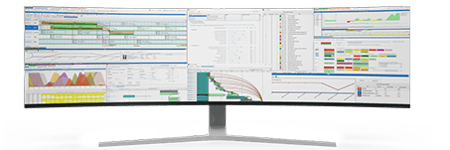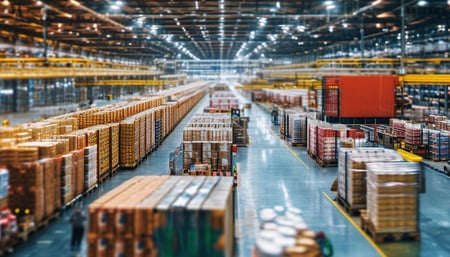The Key to Production Flow Optimization in Food and Beverage Manufacturing
Enhance efficiency in Food & Beverage manufacturing with integrated planning tools like PlanetTogether, streamlining operations for optimal...
Optimize logistics in food and beverage manufacturing with PlanetTogether integration, enhancing efficiency, visibility, and cost savings in supply chain operations.
Operations Directors constantly face the challenge of optimizing the flow of products from production lines to the consumer while maintaining cost-effectiveness, ensuring compliance with safety regulations, and adapting to ever-changing demand. This dynamic environment requires precise planning, visibility, and the ability to adapt quickly to disruptions.
One powerful way to address these challenges is through advanced planning and scheduling (APS) systems that integrate with existing enterprise systems like SAP, Oracle, Microsoft, Kinaxis, and Aveva. Specifically, PlanetTogether’s APS software has become a key tool in enabling F&B manufacturers to streamline logistics and distribution processes, ensuring that the right products reach the right markets at the right time.
This blog will explore how Logistics and Distribution in F&B manufacturing can be optimized through the integration of PlanetTogether with larger enterprise resource planning (ERP) systems, addressing challenges, enhancing visibility, and driving efficiency.

Logistics and distribution are at the heart of F&B manufacturing operations. These functions directly impact cost structures, customer satisfaction, and brand reputation. The nature of the products—often perishable, regulated, and subject to fluctuating demand—adds a layer of complexity that is unique to the industry.
Here are some of the core challenges Operations Directors face in F&B logistics and distribution:
To navigate these challenges, a combination of technology, data, and process optimization is required. This is where an APS system like PlanetTogether comes into play—integrating with ERP solutions to provide end-to-end visibility and decision-making capabilities for logistics and distribution operations.
![]()

For an Operations Director in an F&B manufacturing facility, an integrated approach to logistics and distribution is essential. The integration of APS tools like PlanetTogether with ERP systems such as SAP, Oracle, Microsoft Dynamics, Kinaxis, and Aveva offers a holistic view of the entire supply chain—from raw material procurement to the final delivery of products to the customer.
One of the key benefits of integrating PlanetTogether with ERP systems is the visibility it provides across the entire supply chain. With real-time data integration, Operations Directors can gain insights into the status of production, inventory levels, and transportation activities at any given moment. This level of transparency is crucial for making informed decisions and responding swiftly to disruptions.
For example, a seamless integration between PlanetTogether and SAP allows for real-time tracking of production schedules and logistics processes. When a production line experiences a delay, this information is immediately shared with the logistics team, allowing for adjustments in delivery schedules and inventory management. This proactive approach helps avoid stockouts or excess inventory, both of which can negatively impact profitability.
Food and beverage manufacturers often experience unpredictable demand patterns, especially during seasonal peaks or market fluctuations. The integration of PlanetTogether with ERP systems like Oracle or Kinaxis enables advanced demand forecasting and dynamic scheduling, allowing Operations Directors to better align production output with logistics and distribution needs.
With real-time demand data, PlanetTogether’s APS software can automatically adjust production schedules and suggest optimal logistics routes based on available transportation options and warehouse capacities. This agility helps manufacturers meet consumer demand while avoiding costly overproduction or expedited shipping expenses.
For example, during the holiday season, F&B manufacturers often see a surge in demand for certain products. By integrating PlanetTogether with Oracle’s ERP system, manufacturers can anticipate these spikes, plan for increased production, and coordinate with distribution partners to ensure timely deliveries to retailers, reducing the risk of stockouts during peak times.
Inventory management is a significant challenge in the F&B industry, especially given the perishability of many products. Excess inventory can lead to spoilage and waste, while insufficient inventory can result in missed sales opportunities. An integrated APS system like PlanetTogether can help Operations Directors optimize inventory levels and improve just-in-time (JIT) delivery practices.
By linking PlanetTogether with ERP systems such as Microsoft Dynamics or Aveva, manufacturers can closely monitor inventory levels, product expiration dates, and delivery schedules. This enables better synchronization between production and distribution, ensuring that fresh products are delivered to customers without overstocking warehouses.
For example, if a facility is producing beverages with a short shelf life, PlanetTogether can analyze production schedules and warehouse capacity, coordinating with logistics providers to ensure that products are shipped out as soon as they are produced, minimizing the time spent in storage. This reduces the risk of spoilage and ensures fresher products reach consumers, improving customer satisfaction and minimizing waste.
Transportation costs are a major concern for F&B manufacturers, especially given rising fuel prices and increasing regulatory pressures to reduce carbon emissions. The integration of PlanetTogether with ERP systems can help manufacturers optimize transportation routes, consolidate shipments, and reduce both costs and environmental impact.
For instance, when integrated with SAP or Oracle, PlanetTogether can analyze transportation routes, identify opportunities for route optimization, and suggest ways to consolidate deliveries. By combining multiple orders into a single shipment, manufacturers can reduce fuel consumption, lower transportation costs, and decrease carbon emissions.
Additionally, PlanetTogether’s scheduling capabilities allow for better coordination between production and shipping, ensuring that trucks are fully loaded before departing the facility. This reduces the number of trips required, further minimizing transportation costs and environmental impact.
Regulatory compliance is a top priority in the F&B industry, where stringent standards govern food safety, labeling, and traceability. Non-compliance can result in product recalls, legal penalties, and damage to a company’s reputation. The integration of PlanetTogether with ERP systems like SAP or Aveva ensures that manufacturers can maintain full traceability throughout the production and distribution process.
With an integrated system, Operations Directors can track the movement of products from the moment raw materials enter the facility to the point of delivery to the end customer. This level of traceability is essential for ensuring compliance with food safety regulations, as well as for identifying and isolating potentially contaminated products in the event of a recall.
For example, in the event of a contamination issue, PlanetTogether’s integration with SAP can provide real-time visibility into which batches of products were affected, where they were shipped, and which retailers received them. This enables a targeted recall, minimizing the impact on the business while protecting consumers and maintaining compliance with regulatory requirements.

As the food and beverage industry continues to evolve, logistics and distribution will remain critical areas of focus for Operations Directors. The integration of APS systems like PlanetTogether with ERP platforms is just the beginning. In the coming years, we can expect to see several key trends that will further shape the logistics and distribution landscape in F&B manufacturing:
Increased Use of Artificial Intelligence and Machine Learning: AI and machine learning technologies will play a growing role in optimizing logistics and distribution processes. By analyzing vast amounts of data, these technologies can identify patterns, predict disruptions, and suggest optimal solutions for routing, inventory management, and demand forecasting.
Greater Emphasis on Sustainability: As consumers become more environmentally conscious, F&B manufacturers will face increasing pressure to reduce their carbon footprint. This will drive further innovations in transportation optimization, packaging materials, and energy-efficient warehousing practices.
Expansion of E-Commerce and Direct-to-Consumer Models: The rise of e-commerce and direct-to-consumer models will require F&B manufacturers to rethink their logistics and distribution strategies. This will involve greater investment in last-mile delivery solutions and the integration of new technologies to meet consumer expectations for fast, reliable shipping.
**Adoption of Advanced Robotics and Automation**: The adoption of robotics and automation in warehousing and distribution is set to grow. Automated guided vehicles (AGVs), drones, and robotic picking systems will play a significant role in speeding up warehouse operations, reducing labor costs, and improving accuracy. F&B manufacturers will increasingly rely on these technologies to optimize the flow of goods and meet tight delivery windows.
Blockchain for Enhanced Traceability: Blockchain technology is gaining traction in the F&B industry, particularly for enhancing traceability and ensuring food safety compliance. By using blockchain, manufacturers can create immutable records of a product’s journey through the supply chain, from farm to table. This will not only improve transparency but also help in responding quickly to food safety incidents.
Integration with Internet of Things (IoT): IoT devices are becoming more prevalent in F&B manufacturing and logistics. Sensors placed on trucks, storage facilities, and production lines can provide real-time data on temperature, humidity, and other critical factors that impact product quality. Integrating IoT with PlanetTogether and ERP systems will allow Operations Directors to monitor the condition of products throughout the supply chain, ensuring that quality standards are met from production to delivery.
To successfully implement and leverage the integration of PlanetTogether with ERP systems for logistics and distribution optimization, Operations Directors in F&B manufacturing should follow several best practices:
Before embarking on any technology integration, it’s essential to have a clear understanding of the goals you want to achieve. Are you aiming to reduce transportation costs, improve on-time deliveries, or enhance traceability? Defining these objectives will help guide the integration process and ensure that the solution addresses your most critical challenges.
Successful integration requires input and collaboration from multiple departments, including production, IT, logistics, and quality assurance. Engage these stakeholders early in the process to ensure that the integration meets the needs of all areas of the business. This also helps in identifying potential challenges or bottlenecks that may arise during the integration process.
Data is the foundation of any integrated system, so it’s essential to ensure that your data is accurate, up-to-date, and consistent across all systems. This may involve cleaning up existing data and establishing protocols for maintaining data quality going forward. Accurate data will enable better decision-making and reduce the risk of errors in scheduling, forecasting, and distribution.
Even the most sophisticated technology is only as effective as the people using it. Invest in comprehensive training for your team to ensure they are comfortable with the new systems and understand how to use them to their full potential. This will help smooth the transition and ensure that you maximize the benefits of the integration.
Once the integration is in place, it’s important to continually monitor its performance and look for opportunities for improvement. Regularly review key performance indicators (KPIs) such as on-time delivery rates, transportation costs, and inventory turnover to ensure that the system is delivering the expected results. Be prepared to make adjustments as needed to optimize performance.
In the fast-paced world of food and beverage manufacturing, logistics and distribution play a crucial role in determining the success of a company. The integration of advanced planning and scheduling systems like PlanetTogether with ERP platforms such as SAP, Oracle, Microsoft Dynamics, Kinaxis, and Aveva offers a powerful solution to the many challenges faced by Operations Directors. By enhancing visibility, optimizing scheduling, improving inventory management, and reducing transportation costs, this integration enables manufacturers to stay competitive in a demanding market.
Looking ahead, as technology continues to evolve, the F&B industry will see even more opportunities to innovate and improve logistics and distribution processes. By embracing these advancements, Operations Directors can not only meet current challenges but also position their companies for long-term success in an increasingly complex and competitive landscape.
Incorporating tools like PlanetTogether into your operational strategy is no longer just a "nice-to-have"; it’s becoming a necessity for those aiming to optimize their logistics and distribution in today’s fast-paced and dynamic food and beverage market.
Whether you are navigating fluctuations in demand, addressing sustainability concerns, or ensuring compliance with ever-evolving regulations, integrated technology solutions offer the agility and insight needed to succeed. And as customer expectations for speed, reliability, and transparency continue to rise, staying ahead of the curve with these integrations will be key to maintaining a competitive edge.
By taking a proactive approach to logistics and distribution, leveraging the power of integration, and staying focused on continuous improvement, F&B manufacturers can streamline operations, reduce costs, and ultimately deliver a superior product to their customers.
Are you ready to take your manufacturing operations to the next level? Contact us today to learn more about how PlanetTogether can help you achieve your goals and drive success in your industry.
Enhance efficiency in Food & Beverage manufacturing with integrated planning tools like PlanetTogether, streamlining operations for optimal...
Optimize food and beverage manufacturing with PlanetTogether and ERP integration for smarter scheduling, reduced waste, and enhanced supply chain...
Unlock efficiency in food & beverage manufacturing with real-time scheduling optimization. Adapt to market changes and boost agility for competitive...
Be the first to know about new B2B SaaS Marketing insights to build or refine your marketing function with the tools and knowledge of today’s industry.